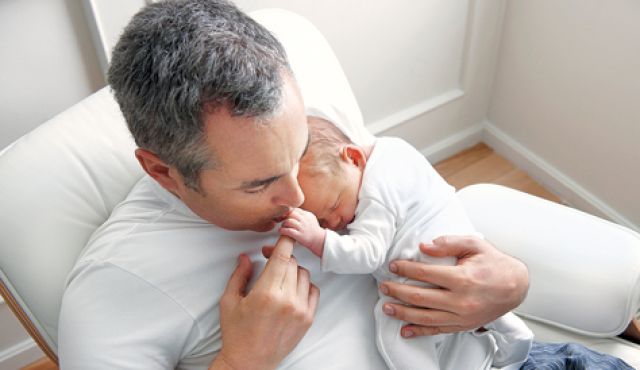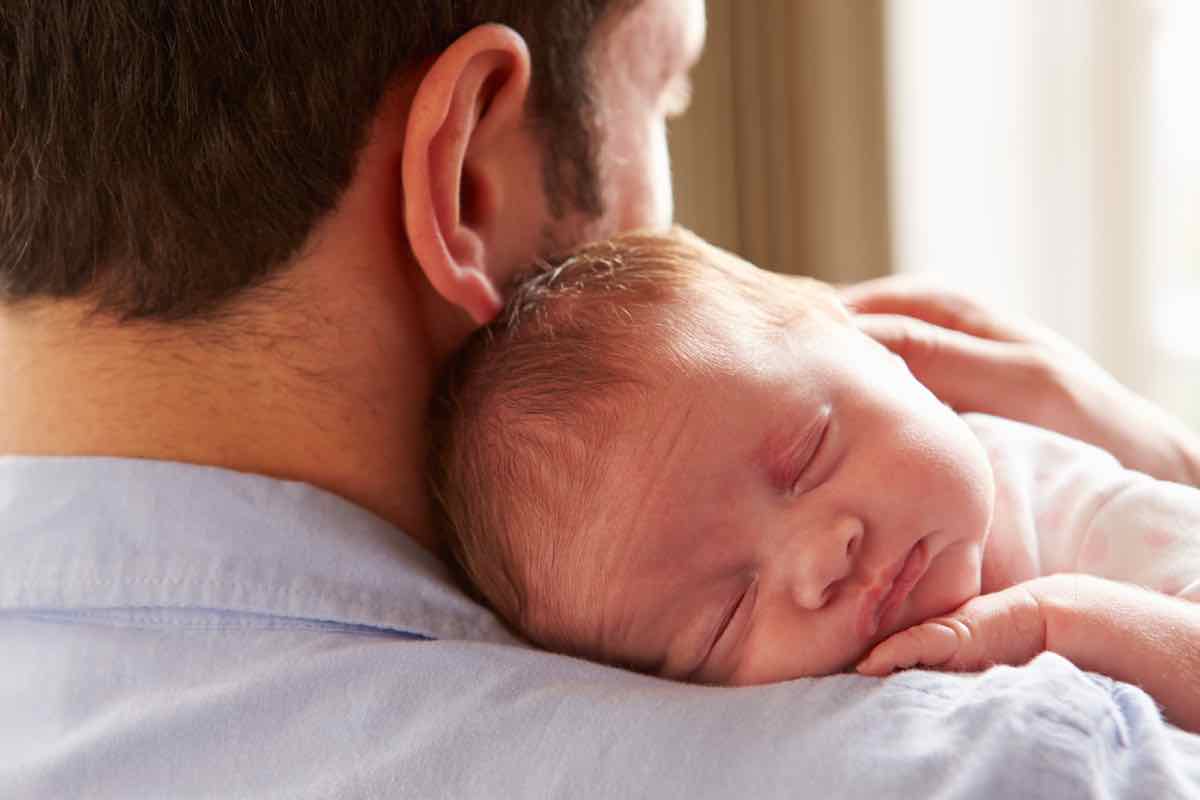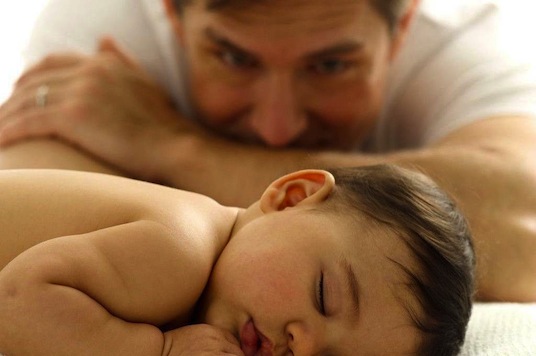Your Father's Arms: A Wonderful Place To Grow


Written and verified by the psychologist Valeria Sabater
We all know that few places are as safe, affective and important for a child’s development as their mother’s arms. But what about their father’s arms?
Although men don’t breastfeed or give birth, their closeness, affection, voice and even their skin are all incredibly important aspects for a newborn child.
Today there are hundreds of hospitals that have integrated wonderful birth protocols, such as kangaroo care.
For example, when a mother is still recovering from anesthesia after a caesarean section, fathers have the choice of performing kangaroo care.
With some embarrassment, excitement and a little fear, they take off their shirts to receive their newborn baby on their chest.
There are only a few sights as comforting as that image. The newborn regulates its temperature, relieves stress and has its first skin-to-skin contact with a person that will form a big part of their lives.
This initiative should undoubtedly be carried out in all medical centers. A father’s arms become a safe, warm and important place in their baby’s life.
We invite you to explore this topic a little more.
Growing up in dad’s arms
A lot is said about hormonal changes that women experience during pregnancy and lactation. We all know about this and many readers have surely experienced the exact same thing.
As amazing as it may seem, the father’s brain also has its own hormonal and emotional merry-go-round during the same process.

Less testosterone during parenting
This is interesting data. According to a study carried out at Northwestern University of Illinois, United States, testosterone levels are reduced significantly when a man becomes a father.
- This hormone fulfils its function during courtship, passion and intimacy. Its highest peaks are found during the first moments of seduction, in which each person must try their best to attract the other.
- However, when the couple begins the process of pregnancy and the woman finally gives birth, the father’s brain needs less testosterone. Their only functions now are to guarantee the safety and survival of their child, attend to them and take care of them.
The “maternal” instinct is not exclusive to women
To a large extent, all of us are born with the natural instinct to provide care, attention and affection for our children.
You can spend a large part of your life believing that its not the case, however, the act of giving birth and feeling your little one in your arms activates what is know as the “paternity network.”
- Brain structures such as the amygdala, the insula and the nucleus accubens participate in this internal circuit.
- For women it is almost a “primitive” instinct. Men, however, develop this process by feeling the closeness of their baby.
- According to research carried out by the University of Bar-IIan in Israel, a man’s brain becomes more “maternal” if he is responsible for more functions at home.
Aspects such as co-sleeping with the baby, giving them a bottle, bathing them or rocking them in their arms, intensifies this instinct.

On dad’s skin
We know that the “skin to skin” method is equally beneficial if the father has the baby on his chest. This amazing contact will always be better than a crib. It will always alleviate more fears than a simple sheet could.
The kangaroo method is no longer exclusive to mothers, because nowadays, fathers know that they are more than mere spectators.
Raising a child means teamwork; while the mother breastfeeds, dad can offer his chest for the baby to sleep on, to feel the safety of a heart that will always be by their side.
They have someone who will defend them from any danger, that will encourage them to accomplish each and every one of their dreams.
Many studies even promote the need to practice this delicate art of love and care when it comes to taking care of premature babies.
- It regulates temperature and breathing
- Reduces infections
- Favors neuronal maturity
- Increase the quality of the baby’s rest
- Offers tactile, auditory and movement stimulus.
- Favors weight gain
- The baby will cry less and will also become better adapted to extra-uterine life

In conclusion, we know that there is always talk of the mother’s importance in a baby’s life, especially in the first stage of the process when the baby only needs three things: breast milk, affection and routines.
Aside from breastfeeding, the father can carry out all the other tasks and contribute to their child’s healthy development with his hugs, affection and attention.
Let’s all be active protagonists in the upbringing of our children: mothers and fathers.
We all know that few places are as safe, affective and important for a child’s development as their mother’s arms. But what about their father’s arms?
Although men don’t breastfeed or give birth, their closeness, affection, voice and even their skin are all incredibly important aspects for a newborn child.
Today there are hundreds of hospitals that have integrated wonderful birth protocols, such as kangaroo care.
For example, when a mother is still recovering from anesthesia after a caesarean section, fathers have the choice of performing kangaroo care.
With some embarrassment, excitement and a little fear, they take off their shirts to receive their newborn baby on their chest.
There are only a few sights as comforting as that image. The newborn regulates its temperature, relieves stress and has its first skin-to-skin contact with a person that will form a big part of their lives.
This initiative should undoubtedly be carried out in all medical centers. A father’s arms become a safe, warm and important place in their baby’s life.
We invite you to explore this topic a little more.
Growing up in dad’s arms
A lot is said about hormonal changes that women experience during pregnancy and lactation. We all know about this and many readers have surely experienced the exact same thing.
As amazing as it may seem, the father’s brain also has its own hormonal and emotional merry-go-round during the same process.

Less testosterone during parenting
This is interesting data. According to a study carried out at Northwestern University of Illinois, United States, testosterone levels are reduced significantly when a man becomes a father.
- This hormone fulfils its function during courtship, passion and intimacy. Its highest peaks are found during the first moments of seduction, in which each person must try their best to attract the other.
- However, when the couple begins the process of pregnancy and the woman finally gives birth, the father’s brain needs less testosterone. Their only functions now are to guarantee the safety and survival of their child, attend to them and take care of them.
The “maternal” instinct is not exclusive to women
To a large extent, all of us are born with the natural instinct to provide care, attention and affection for our children.
You can spend a large part of your life believing that its not the case, however, the act of giving birth and feeling your little one in your arms activates what is know as the “paternity network.”
- Brain structures such as the amygdala, the insula and the nucleus accubens participate in this internal circuit.
- For women it is almost a “primitive” instinct. Men, however, develop this process by feeling the closeness of their baby.
- According to research carried out by the University of Bar-IIan in Israel, a man’s brain becomes more “maternal” if he is responsible for more functions at home.
Aspects such as co-sleeping with the baby, giving them a bottle, bathing them or rocking them in their arms, intensifies this instinct.

On dad’s skin
We know that the “skin to skin” method is equally beneficial if the father has the baby on his chest. This amazing contact will always be better than a crib. It will always alleviate more fears than a simple sheet could.
The kangaroo method is no longer exclusive to mothers, because nowadays, fathers know that they are more than mere spectators.
Raising a child means teamwork; while the mother breastfeeds, dad can offer his chest for the baby to sleep on, to feel the safety of a heart that will always be by their side.
They have someone who will defend them from any danger, that will encourage them to accomplish each and every one of their dreams.
Many studies even promote the need to practice this delicate art of love and care when it comes to taking care of premature babies.
- It regulates temperature and breathing
- Reduces infections
- Favors neuronal maturity
- Increase the quality of the baby’s rest
- Offers tactile, auditory and movement stimulus.
- Favors weight gain
- The baby will cry less and will also become better adapted to extra-uterine life

In conclusion, we know that there is always talk of the mother’s importance in a baby’s life, especially in the first stage of the process when the baby only needs three things: breast milk, affection and routines.
Aside from breastfeeding, the father can carry out all the other tasks and contribute to their child’s healthy development with his hugs, affection and attention.
Let’s all be active protagonists in the upbringing of our children: mothers and fathers.
This text is provided for informational purposes only and does not replace consultation with a professional. If in doubt, consult your specialist.








